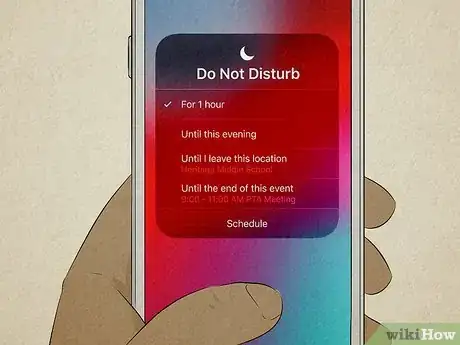This article was co-authored by Lauren Krasny and by wikiHow staff writer, Madeleine Criglow. Lauren Krasny is a Leadership and Executive Coach and the Founder of Reignite Coaching, her professional and personal coaching service based in the San Francisco Bay Area. She also currently coaches for the LEAD Program at Stanford University Graduate School of Business and is a former Digital Health Coach for Omada Health and Modern Health. Lauren received her coaching training from the Coach Training Institute (CTI). She holds a BA in Psychology from the University of Michigan.
This article has been viewed 9,488 times.
A huge part of being a good employee is listening to your boss and coworkers. Being a good listener is a little more complex than simply hearing what someone has to say, though. Thankfully, there are several approaches you can take to being the best listener you can be! Here are some effective methods to improve your listening skills in the workplace.
Steps
Use positive body language.
-
Nod along when your coworkers speak to stay engaged. You can also lean towards them when they're speaking. Both work to help you concentrate on what your colleagues are saying. Encouraging body language like this also shows your coworkers that you're invested. This can make them feel more comfortable talking to you and sharing ideas.[1] X Research source
- If your boss presents a new assignment during a meeting, nod along to show that you're really listening.
- When your colleague pulls you aside to discuss a project you're working on together, lean towards them (without invading their personal space) to actively listen to their ideas.
Make eye contact.
-
You'll feel more focused and engaged with your coworkers. It may seem small, but meeting someone's gaze goes a long way in communicating your interest. Avoid staring at the ground, looking at your phone, or seeming distracted when you're talking to people in the workplace.[2] X Research source
- Look someone in the eye, but don't stare! Simply meet their gaze and try not to overthink it as they speak.
Steer clear of distractions.
-
Stay present when someone is speaking to you. During meetings, you may be tempted to look at your phone, check emails, or zone out completely. Try your best to stay focused so that you can hear everything your colleagues have to say. Switch your phone to the "Do Not Disturb" setting, turn off email alerts, and quiet any thoughts about what you're going to make for dinner. It will be much easier to listen without these interruptions.[3] X Research source
- If you really struggle to stay present in meetings, for example, try taking notes. This can help you stay actively engaged.
Keep an open mind when coworkers share ideas.
-
Snap judgments prevent you from really understanding something. It's perfectly okay to disagree with your coworkers, but wait until after they have finished speaking before making up your mind. It's possible your colleague just thinks about things in a different way than you, and maybe their idea will work even better.[4] X Research source
- Let's say your new coworker wants to have a workplace barbecue, but you think that's corny. Give her a minute to explain her idea before writing it off! It may even be fun.
Picture what your colleague is saying while they speak.
-
This is a great trick to help you focus. As they speak, imagine the images that correspond to what they are saying. When you catch your mind drifting, return to those images. This will help you actively engage with what your boss or coworker is saying, and can be a great tool if you struggle to stay present.[5] X Research source
- If your coworker is going into plans for an upcoming event, picture the event in your head. Maybe she's talking specifically about hiring a catering company or food truck service. Picture the food truck, the guests, and the food itself!
Wait for them to finish speaking before responding.
-
If you don't, you may miss important details. Listening only enough to formulate a reply prevents you from really staying present. It can also quickly lead to misunderstandings. Focus on what your boss or colleagues are saying as they speak. After they're done, that's when you can formulate a response.[6] X Research source
- Though it's always good to be prepared, you may need to hear a few details before coming up with a thoughtful response. There's no harm in taking a moment to think before responding.
Restate what the speaker said.
-
Do this to fully comprehend what your coworker or boss said to you. After a new task has been assigned to you, for example, rephrase the instructions. This shows that you were really listening and that you're taking the time to know for sure you that heard their words correctly. It even helps you deepen your understanding, as formulating what they said in your own words can help improve your comprehension.[7] X Research source
- Preface your words with something like, "Just to make sure I understand you correctly..." and follow that with your interpretation of what they said.
- This also gives them an opportunity to correct you if you misunderstood something they said.
Ask questions to fully understand something.
-
This helps you comprehend and retain information. If someone explains a new concept to you, think of any questions you have and ask them. This will help you clarify anything you're unsure about and actually remember the information down the line. It's also a great way to show your colleagues that you're really considering what they have to say.[8] X Research source
- Ask questions that start with "How," "What," and "Who." If you're delegating responsibilities for a project, you could ask, "Who will be responsible for inputting the data in the spreadsheet?"
- It's better to communicate too much than not communicate enough.[9]
X
Expert Source

Career Coach Expert Interview. 27 March 2020.
Provide feedback.
-
Sharing your point of view helps you become more invested in the work. If you simply take everything as it comes and don't tell people how you feel, you might not listen as closely. Listen attentively in meetings and be forthcoming about your thoughts on the matters your colleagues discuss. You can even (respectfully) provide alternative solutions if you think of any. Participating like this will improve your listening skills and can also make a potentially boring meeting a little more interesting.[10] X Research source
- Let's say your boss wants to hire a band to play at a special event your company is planning. Maybe before this job, you worked in the music industry. Bring up your relevant experience and expertise!
Validate your colleagues' concerns or comments.
-
Part of being a good listener is making people feel heard and supported. To improve your listening skills in the workplace, practice looking at things from your coworkers' points of view and affirming their perspectives. Use phrases like "I totally understand" and "that's completely fair." This is a meaningful way to improve your listening skills, as you need to genuinely concentrate on what someone has to say in order to understand their viewpoint.[11] X Research source
- Let's say your coworker expresses her anxiety about meeting a certain deadline. Say something like, "I totally understand, but you work so hard! I'm sure you'll be able to do it."
- Validating your coworkers' feelings can also help build a sense of community in your workplace.
You Might Also Like
 How to Find Equilibrium Quantity
How to Find Equilibrium Quantity













References
- ↑ https://www.nytimes.com/guides/smarterliving/be-a-better-listener
- ↑ https://www.forbes.com/sites/womensmedia/2012/11/09/10-steps-to-effective-listening/?sh=622445b53891
- ↑ https://www.nytimes.com/guides/smarterliving/be-a-better-listener
- ↑ https://www.forbes.com/sites/womensmedia/2012/11/09/10-steps-to-effective-listening/?sh=622445b53891
- ↑ https://www.forbes.com/sites/womensmedia/2012/11/09/10-steps-to-effective-listening/?sh=622445b53891
- ↑ https://www.psychologytoday.com/us/blog/in-it-together/202006/active-listening-skills
- ↑ https://psychcentral.com/lib/become-a-better-listener-active-listening
- ↑ https://www.nytimes.com/guides/smarterliving/be-a-better-listener
- ↑ Lauren Krasny. Career Coach. Expert Interview. 27 March 2020.
About This Article
























































